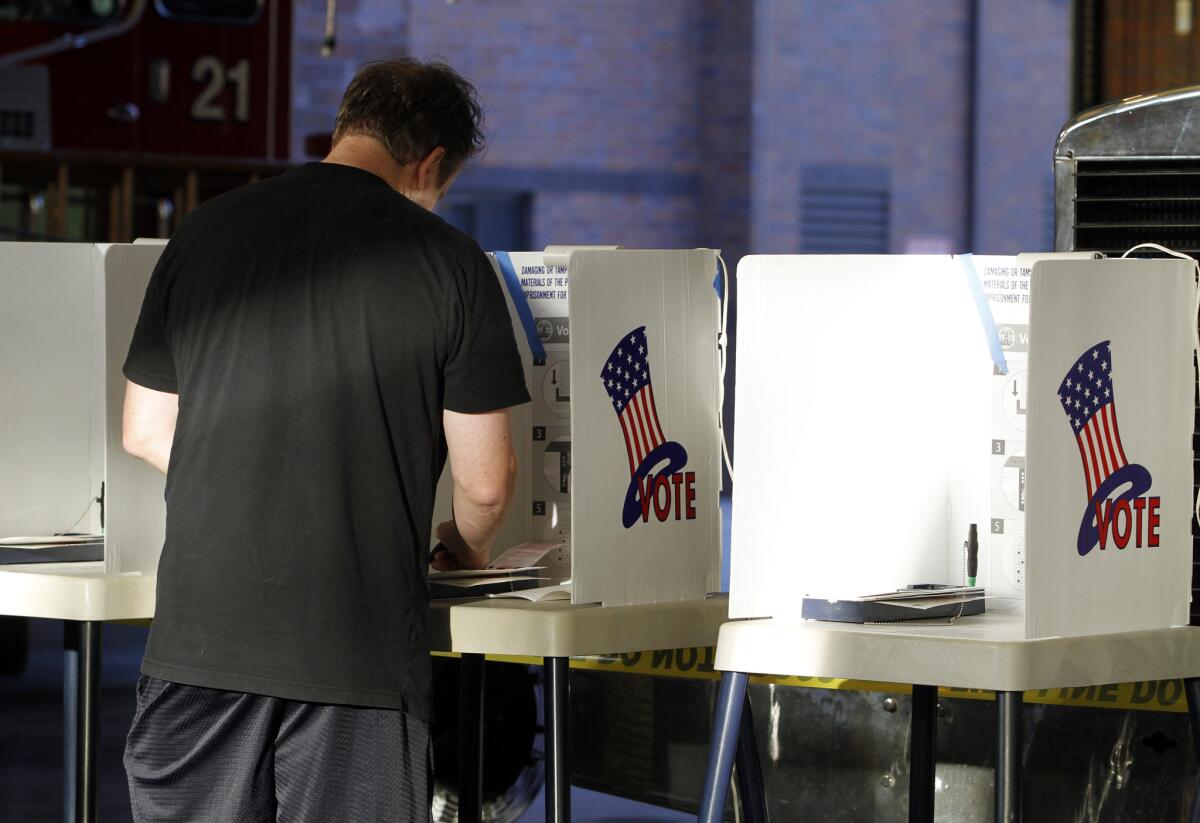Petition’s success puts utility users tax in Glendale voters’ hands

Dave Beuscher of Glendale votes at Fire Station 21 in Glendale, in this Nov. 2014 photo. Glendale voters will get to decide the fate of the utility users tax — which brings in $27 million per year — following a successful push by opponents to get it on the ballot.
- Share via
Glendale voters will get to decide the fate of the utility users tax — which brings in $27 million per year — following a successful push by opponents to get it on the ballot.
A petition circulated by two Glendale citizens and a La Crescenta resident amassed 1,532 names, enough to qualify for a formal initiative to undo the tax.
Money from the tax on electricity, water and gas rates makes up 15% of the general fund. That fund, in turn, pays for the local police and fire departments, as well as parks, libraries and many other services.
The City Council on Tuesday directed City Manager Scott Ochoa to put together a report on the potential effects of losing a revenue stream that big.
Mayor Ara Najarian said he’s strongly opposed to eliminating the tax due to its impact on public safety.
“Any reduction of our budget in the amount of $27 million is going to have direct and adverse consequences on our quality of life and our way of living in the city,” he said in a phone interview.
Eliminating library and park services would amount to roughly $20 million, Ochoa said. The balance would likely be made up from cuts the local police and fire departments, the city manager said.
In 2009, local voters approved lowering the 7% telecommunications tax — another of the utility tax’s five arms — to 6.5%.
But Najarian said he has no doubt informed voters would poll against a repeal.
Ochoa said 80% of residents were satisfied with the Glendale Police Department and 90% were happy with the services of the Glendale Fire Department in the most recent satisfaction survey of residents. A reduction in services is not something that’s desired, he added.
“Nobody is clamoring for this to go way, to change the level of service,” the city manager said. “What it appears to be to me is an ideological complaint that they just don’t like taxes.”
Another reason a local utility tax is in play is because revenue streams differ from city to city, the city manager said. Some communities have a business license tax, for example, while Glendale does not, he added.
Ochoa and Najarian said they would like to hear alternatives from tax opponents and what they would like to have stricken from the budget.
Bill Taliaferro, one of the petition’s circulators, said coming up with an alternative budget is not his problem, but suggests there may be too many benefits being doled out within City Hall.
“You can’t keep paying people this money and not balance the budget. You’ve got to cut something and think, ‘Maybe we can’t do all these things we really want to do,’” he said.
A similar petition fell short of the required amount of signatures last year.
This time around, the number of signatures collected was above the required threshold of 5% of the turnout during the last gubernatorial election, said City Clerk Ardy Kassakhian.
Proposition 218 affords the right to citizens to challenge the utility tax with a vote.
The council has the authority to place the item on the ballot as early as next spring’s primaries or as late as the next municipal election in 2017, he said.
Council members will decide the timing at an upcoming meeting.
Taliaferro said one of his motivations was to show that local residents have the power to influence local taxes.
“They’re complaining that it’s somebody else’s fault,” he said. “Maybe it’s our fault for not saying something.”
--
Arin Mikailian, arin.mikailian@latimes.com
Twitter: @ArinMikailian
